Related Research Articles

Kirkuk is a city in Iraq, serving as the capital of the Kirkuk Governorate, located 238 kilometres north of Baghdad. The city is home to a diverse population of Kurds, Turkmens and Arabs. Kirkuk sits on the ruins of the original Kirkuk Citadel which sits near the Khasa River.
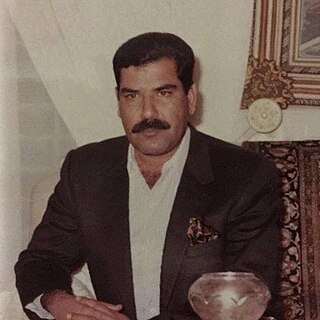
Watban Ibrahim al-Nasiri was an Iraqi politician and former Interior Minister of Iraq. He was the half-brother of Saddam Hussein and the brother of Barzan al-Tikriti. He was taken into coalition custody 13 April 2003, following his capture as he tried fleeing to Syria. He died in prison of natural causes in 2015.
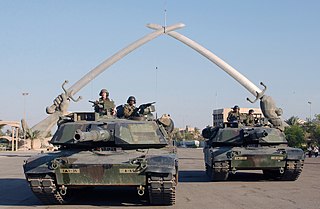
The following is a timeline of major events during the Iraq War, following the 2003 invasion of Iraq.
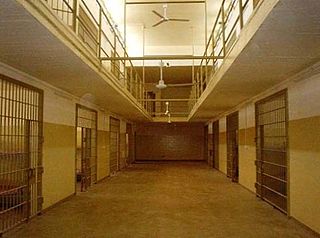
Abu Ghraib prison was a prison complex in Abu Ghraib, Iraq, located 32 kilometers (20 mi) west of Baghdad. Abu Ghraib prison was opened in the 1950s and served as a maximum-security prison. From the 1970s, the prison was used by Saddam Hussein to hold political prisoners and later the United States to hold Iraqi prisoners. It developed a reputation for torture and extrajudicial killing, and was closed in 2014.
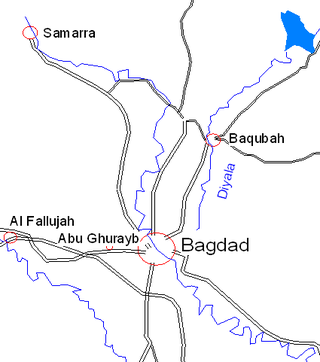
Abu Ghraib is a city in the Baghdad Governorate of Iraq, located just west of Baghdad's city center, or northwest of Baghdad International Airport. It has a population of 189,000 (2003). The old road to Jordan passes through Abu Ghraib. The government of Iraq created the city and Abu Ghraib District in 1944.
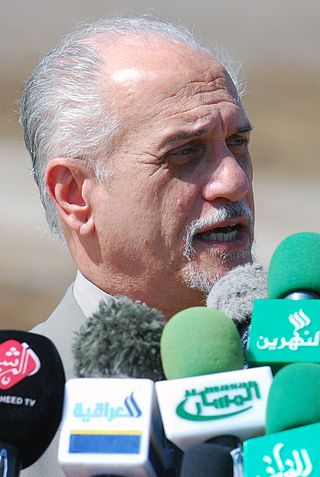
Hussain Ibrahim Saleh al-Shahristani is an Iraqi politician who served in different cabinet posts, including as Iraq's Minister of Higher Education.
Farzad Bazoft was an Iranian journalist who settled in the United Kingdom in the mid-1970s. He worked as a freelance reporter for The Observer. He was arrested by Iraqi authorities and executed in 1990 after being convicted of spying for Israel while working in Iraq.
Events in the year 2005 in Iraq.
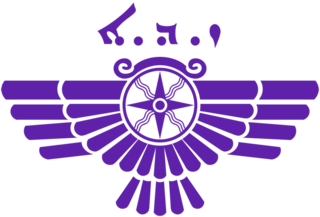
The Assyrian Democratic Movement, popularly known as Zowaa, is an Assyrian political party situated in Iraq, and one of the main Assyrian parties within the Iraqi parliament. The Assyrian Democratic Movement states its aims are to establish equal citizenship rights with the rest of the Iraqi people without discrimination on the basis of nationality, belief, religious affiliation, culture, language and other characteristics of the native Chaldo-Assyrian Syriac people of Iraq, to acknowledge the past massacres committed against them and to ensure they are never repeated again.

The Battle of Abu Ghraib took place between Iraqi Mujahideen and United States forces at Abu Ghraib prison on April 2, 2005.

Abdul Rahman Mustafa, The Kurdish mayor-governor of Kirkuk, was elected in 2003 by multiethnic Kirkuk City Council under supervision of Coalition Provisional Authority in Post-Saddam Hussein Iraq. Has a law degree from Baghdad University. Visited Dallas, Texas as part of partners for peace, an International Goodwill agreement with Dallas.
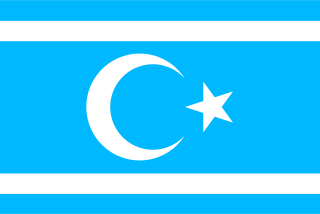
The Iraqi Turkmen, also referred to as Iraqi Turks, Turkish-Iraqis, the Turkish minority in Iraq, and the Iraqi-Turkish minority are Iraq's third largest ethnic group. They make up to 13% of the Iraqi population and are native to northern Iraq. Iraqi Turkmen share ties with Turkish people, and do not identify with the Turkmen of Turkmenistan and Central Asia.
Mohammed Abdullah al-Shahwani is an Iraqi general and the former director of the Iraqi National Intelligence Service.
The Dujail massacre was a mass killing of Shia rebels by the Ba'athist Iraqi government on 8 July 1982 in Dujail, Iraq. The massacre was committed in retaliation to an earlier assassination attempt by the Shia Iranian supported Islamic Dawa Party against the then President of Iraq, Saddam Hussein. The town of Dujail had a large Shia population, with 75,000 residents at the time of the incident, and was a well-known stronghold of the Dawa Party. It is located approximately 53 km (33 mi) from the capital of Baghdad, in the Sunni-majority Saladin Governorate of Iraq.
Dhia Habib Fahmi Al-Khayali was the coach of the first official Iraqi national team that played Turkey in Izmir in 1951. The Iraqi team was made up of top players from Baghdad, Basra and Habbaniya. Iraq played two matches in the Turkish cities of Izmir and Ankara in May 1951 where the Iraqi national side played Turkey B and an Ankara Select XI. They lost both matches 7-0 and 7-5.

The Kurdistan Democratic Party, usually abbreviated as KDP or PDK, is the largest party in Iraqi Kurdistan and the senior partner in the Kurdistan Regional Government. It was founded in 1946 in Mahabad in Iranian Kurdistan. The party states that it combines "democratic values and social justice to form a system whereby everyone in Kurdistan can live on an equal basis with great emphasis given to rights of individuals and freedom of expression."

Altun Kupri is a town in Kirkuk Governorate, Iraq. Its inhabitants are predominantly Turkmen, with a minority of Arabs and Kurds. It is located on the shores of the Little Zab and on the Erbil–Kirkuk road. The town is described as having an 'intrinsic strategic significance' and is disputed.
Arshad al-Salihi is an Iraqi Turkmen politician who has been leader of the Iraqi Turkmen Front since May 2011, and a member of the Iraqi parliament since 2010.

The 1991 Altun Kupri massacre occurred on 28 March 1991 in the Turkmen town of Altun Kupri, Kirkuk Governorate, Iraq. The massacre targeted Turkmens, in particular males, both children and adults alike, and was organized by security forces affiliated with Saddam Hussein's army. It came as a result of curbing the 1991 uprising in the dissident areas in the north and south of the country.
References
- ↑ "Arxivlənmiş surət". Archived from the original on 2022-05-28. Retrieved 2023-02-10.
- ↑ "16 Ocak Türkmen Şehitleri Günü - QHA - Kırım Haber Ajansı". www.qha.com.tr (in Turkish). Retrieved 2023-03-24.
- ↑ "Arxivlənmiş surət". Archived from the original on 2023-02-10. Retrieved 2023-02-10.
- ↑ Küzeci, Dr Şemsettin. "16 OCAK TÜRKMEN ŞEHİTLERİ GÜNÜ | IRAK TÜRKLERİNİN BAĞIMSIZ SİYASİ GAZETESİDİR" (in Turkish). Retrieved 2023-03-24.
- 1 2 3 4 "Arxivlənmiş surət". Archived from the original on 2023-02-10. Retrieved 2023-02-10.
- 1 2 3 4 "بمراسم في كركوك.. تركمان العراق يحيون ذكرى "يوم الشهيد"". www.aa.com.tr. Retrieved 2023-03-24.